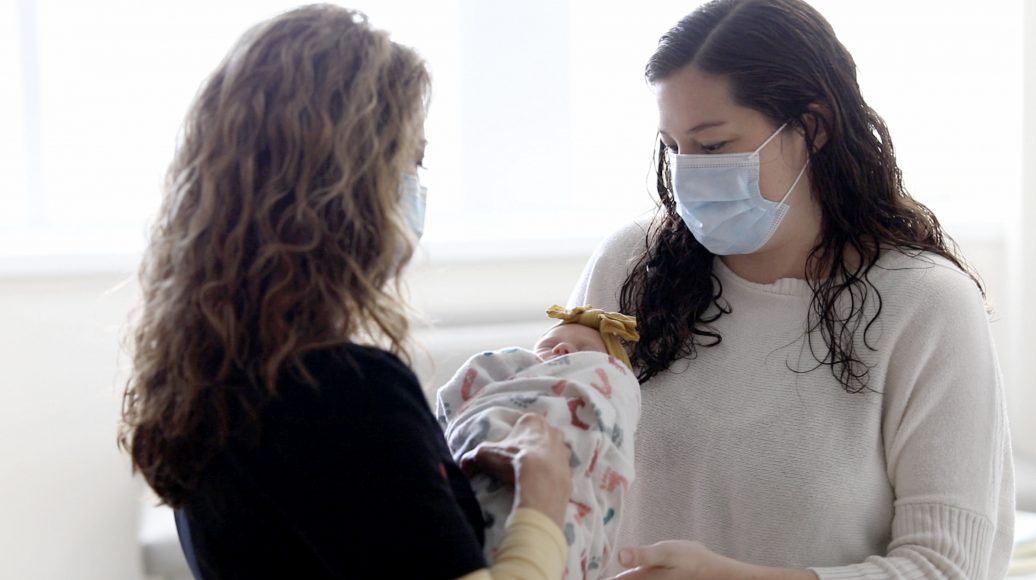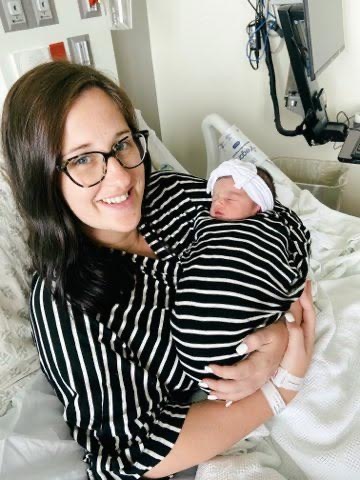Unsure about what happens next after you deliver your sweet baby? Here are 10 things you can expect!
When you’re having a baby, there’s a wealth of information about giving birth. But
after you deliver, what comes next? The experts at Mercy Hospital St. Louis
shared 10 helpful insights about your hospital stay, whether it’s your first baby or
you’re already a mom.

1. Skin-to-skin time isn’t just for moms.
Healthy, full-term babies are placed belly-down on mom’s chest for skin-to-skin contact right after birth. This intimate time promotes bonding and breastfeeding
while stabilizing baby’s temperature, breathing, heart rate, and blood sugar. But
skin-to-skin time isn’t just for moms. “We also encourage fathers or partners to
perform skin-to-skin and share in the moment. It’s important for bonding and helps
the baby transition to the outside world,” says Marie Collins Hespen, Mercy’s labor
and birth nurse manager. She also says you may be very hungry after labor, and it’s
okay to enjoy a meal while your partner snuggles your baby.
And nurses don’t have to take your baby away to do health checks. “As long as the
baby is doing well after delivery, everything we need to do assessment-wise can be
done while they’re on mom’s chest,” says Kaylen Knepp, a labor and birth nursing
supervisor.
2. Your baby doesn’t get a bath right away.
Babies used to get baths within an hour or two of birth. Many parents are surprised
to learn that’s changed over the last few years. Mercy nurses wait at least eight
hours to bathe newborns, so babies can benefit from the white coating on their
bodies called vernix. Vernix helps prevent infection while also moisturizing skin.
While baths are an exciting “first” for your baby, they’re also safest when delayed,
so that your baby doesn’t get too cold too soon and develop blood sugar issues.
3. Don’t be surprised if your baby is very sleepy.
It’s something the Mercy nursing team says many new parents don’t realize ― after
all the excitement of being born, your baby is super-tired. So, while you’re excitedly
counting little fingers and toes, your baby may start snoozing. “Newborns enter a
very sleepy phase about an hour or two after you deliver, and they’re very sleepy for
the next 24 hours. That’s why initial skin-to-skin time is so important, especially for
moms who are hoping to breastfeed,” says Collins Hespen.
4. Your recovery can take some time.
Your baby’s finally here, but your body’s been through big changes. Dr. Madeline
Giacalone, a Mercy Clinic OB/GYN, says recovery time is important. “Even if you’ve
had the easiest delivery, you and your partner need to rest and take care of
yourselves,” she advises. Although you’ll want to be posting pictures and calling
loved ones after you deliver, you need to recover, too. Dr. Giacalone also says to expect cramping after both vaginal and C-section deliveries. “Cramping can worsen with every baby you deliver, but your care team works with you to manage pain. They’ll also help
you get up and move around when you’re able,” she says. And if you have a C-
section, Dr. Giacalone says it’s important to remember that you’re recovering from
abdominal surgery. “Be patient with the healing process, and ask for help when you
need it. Follow instructions from your OB/GYN or certified nurse midwife about pain
relief, wound care, lifting, driving, and other activities after a C-section,” she adds.
5. Breastfeeding takes patience and practice.
Take it from Dr. Giacalone, a mom of twins: Don’t expect to be a breastfeeding pro
right away. “It seems like it should just happen naturally, but breastfeeding does
take time and practice. Be patient with your baby and yourself,” she says. And if
you need help, breastfeeding experts are close by. In addition to Mercy’s lactation
consultants, some bedside nurses are also lactation-certified. “Our lactation
consultants and nurses are really amazing resources for moms. They provide a lot
of reassurance,” says Knepp.
6. Your baby sees a pediatrician before going home.
Here’s why everyone’s been asking, “Do you have a pediatrician yet?” Your baby’s
first doctor visit happens in the hospital. Once your baby arrives, your pediatrician is
notified. And within the first 24 hours of life, your baby has a thorough pediatric
exam, either by your own pediatrician or a pediatric hospitalist (a pediatrician who
primarily works in the hospital). While in the hospital, you’ll call your pediatrician to
schedule your baby’s first appointment outside the hospital, which is usually 24-48
hours after discharge.
7. Who does your baby boy’s circumcision? It depends.
If you choose circumcision, it’s likely the doctor who delivered your son will take
care of it. But Dr. Giacalone says that’s not always the case. “It depends on the
hospital and where it’s located. At Mercy Hospital St. Louis and generally in our
area, obstetricians do circumcisions. But in some facilities and geographic areas, it’s
completely pediatrician-based.” And if you plan to have a religious circumcision, be
sure to let your care team know. In the hospital, circumcisions are done a day or
two after you deliver. Your Mercy nurse shows you how to clean the area until it heals.
8. There’s a good reason you don’t see many babies in the
nursery.
Healthy newborns stay with their mothers instead of spending most of their time in
the nursery. “Rooming-in” is recommended by the American College of Obstetricians
and Gynecologists and the American Academy of Pediatrics. Studies show it
promotes breastfeeding, helps you learn your baby’s cues, and boosts your confidence to care for them at home. And moms who room-in are less likely to develop postpartum depression. “We explain the benefits of rooming-in when you’re admitted, but it’s not required. Our nursery is open 24/7,” says Jennifer Pipkin, Mercy’s mother-baby nurse manager.
9. Your care team wants you to speak up.
There’s no shame in asking for help, especially when experts are all around you.
“We encourage you to speak your truth and advocate for yourself, especially during
a pandemic. If you need help with something, ask for it. I always joke that I’m a
nurse and my husband is a pharmacist, and we had no idea what to do when two
children were handed to us. It’s OK to not know something and to ask us questions,”
says Brittany Huddleston, a labor and birth nurse clinician. And don’t be afraid to
speak up if you’re feeling down. Your care team will talk with you about postpartum
depression, so be honest about how you feel. Postpartum depression is a medical
condition, and it’s treatable. Your caregivers will let you know the signs to watch for
at home since postpartum depression can develop at any time after you deliver.
Whatever your concerns in postpartum recovery and beyond, reach out to your
OB/GYN, pediatrician, or other caregivers for help.
10. Every baby is different, and so is every birth.
Just as children are born with dramatically different personalities, their births can be
unique as well. Pipkin says this surprises some parents. “If you’ve been through the
birth experience before, you may expect it to be similar to the last ― however, it
can be or feel different. At Mercy, we really try to individualize everyone’s
experience. Our staff works hard to meet your expectations, and we’re committed
to providing you and your baby with the best care possible,” Pipkin says.
New to newborn care? Download Mercy’s free Newborn Care Guide to build your pro
skills on bonding, bathing ― and yes, burping.













